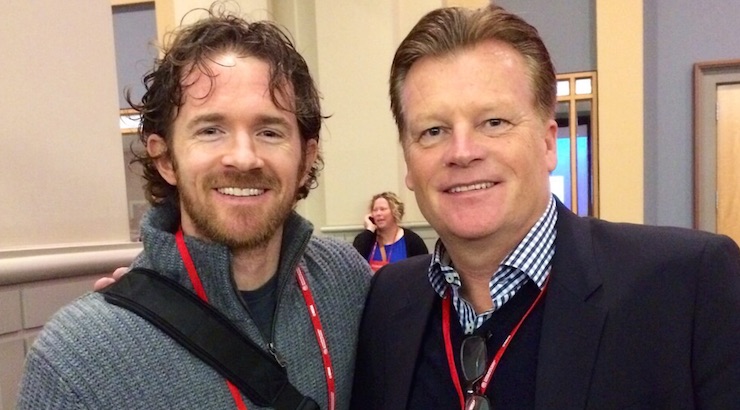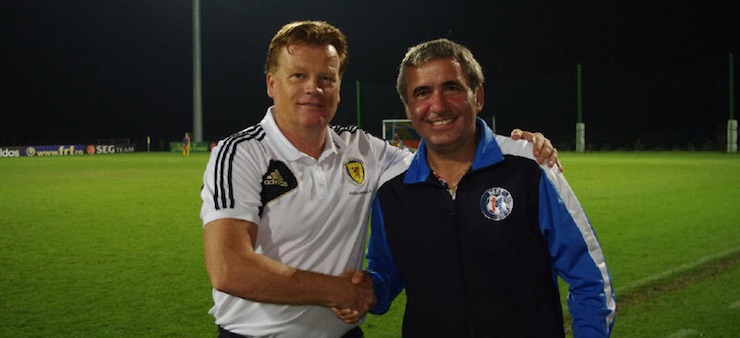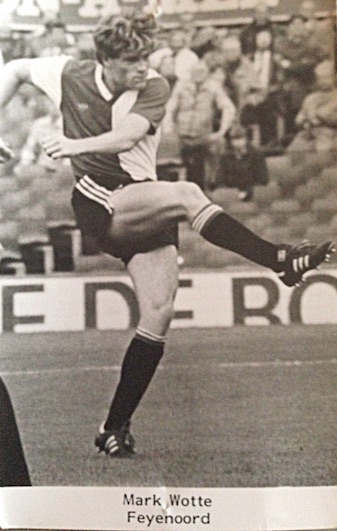Winning by Developing is Wotte’s Youth Soccer Philosophy
Mark Wotte has coached and managed teams from all over the world – the Netherlands, Egypt, Qatar, England, Romania, and of course Scotland where he was the first Performance Director of the Scottish Football Association (SFA). Wotte set up ground breaking youth development programs for the Scottish FA. “By training the kids five times a week in an holistic approach with a curriculum based upon creating an all-around, well-educated player, person and student, we are increasing quality training and contact time with the ball, contributing to the 10,000 hours principle.”
Wotte says “Youth football is the lifeline for all professional clubs, with a return on investment they can have a sustainable economical position, so I think it should be an integral part of every club strategy.”
What did Wotte think of youth soccer in America? Here is the first interview of a multi-part series.
Diane Scavuzzo: In general, what is the difference between player development in the USA and abroad?
Mark Wotte: I am convinced that lots of people are very committed and working hard to develop the next generation of soccer in the USA.
Diane Scavuzzo: What is the biggest problem with youth development in the USA?

Mark Wotte: It is not easy for the US to match the European or South American standards regarding Youth Development as quickly as maybe needed.
Several European Countries are ahead of the USA and since the 1970’s-80’s Germany, Spain and Holland have achieved the right:
• Infrastructure (Club structure, youth league set up and proper facilities)
• Accessibility (Every kid should be able to play soccer all year round)
• Philosophy of the Game (Consistent philosophy and developmental approach)
• Level of Coach Education (Creating lots of soccer teachers to ‘educate’ all level coaches and drive the desire to learn)
It takes the right leadership, strategy and commitment in the US to catch up and I can see there is a real effort is going on at the moment.
Diane Scavuzzo: If you could change one thing, what would it be?
Mark Wotte: To make people realize that developing players takes tine and a plan. One of the most prolific differences in my opinion is the approach regarding educating young kids to become world-class players. It takes a 15-year development plan for every kid to become close to Messi with the right coaching during the ages and stages.

Diane Scavuzzo: What is needed?
Mark Wotte: America needs to combine the typical US ‘winning mentality’ with developing the right technical skills and train the football brain to increase decision making.
Developing intelligent, balanced and technical players who are ready to adapt step-by-step to develop to their maximum potential.
Diane Scavuzzo: Why do you think America has not been more successful so far at developing a homegrown Messi?
Mark Wotte: America needs to create more quality football teachers who are able to drill the skills but also train the brain is essential for success. There is too much emphasis on the physical development, this will follow consequently when the kids become mature and specialized training can be added at that stage.
In Holland, we don’t waste a minute with physical training until the players are 16 or 17 years old but make a well thought and deliberate choice to use the earlier years and this precious time for technical/tactical/personality development.
Focusing merely on Individual technical training and all kind of small sides games (4 v 4 and 7 v 7) is not only smart but successful. It ensures that the players are also enjoying soccer as this is a lot of fun for the kids. Focusing on Best v Best from the age of 11 and 12 yeas of age accelerates development in a natural way.
It is important that youth players are guided by soccer coaches with the right psychological and pedagogical knowledge how to teach that age group.
Diane Scavuzzo: What is your recommendation?

Mark Wotte: I have seen the set up at Philadelphia Union Academy. If the US could have maybe forty or fifty of such Elite Player Development Centers combining Soccer Development with an ‘in-house’ High School located in the hotbeds of US Soccer, it would definitely pay off in five or ten years.
Diane Scavuzzo: You mentioned that Futsal was not very popular in Scotland … how important is Futsal?
Mark Wotte: There is not really a Futsal culture in Scotland when I arrived to work with the FA. Quick feet, first touch, technical skills, quick pass and move as well as quick transitions are developed in a natural way and I would encourage all youth coaches to do a Futsal session at least once a week.
Now, there is a National Futsal Team that played their first International game v Israel in 2014.
Diane Scavuzzo: You played soccer professionally for Feyenoord Rotterdam among other clubs in the Netherlands. Although your playing career ended because of an injury, what is your most memorable moment?
Mark Wotte: My greatest memory of my short career was playing in the Dutch ‘El Classico’Feyenoord – Ajax 2-2 in 1982. I was only as a sub but nevertheless playing on the same field as Johan Cruyff, Willem van Hanegem and Wim Jansen for me and remembering the 1974 semi final Brazil-Holland was an amazing experience.






